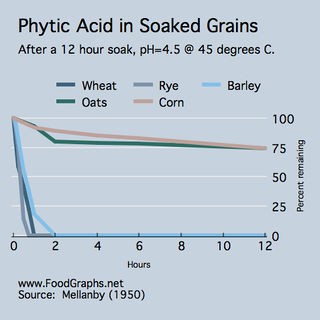Phytic Acid
Phytic acid, while a beneficial substance with an important purpose can be a serious problem in our diet.
Anti-nutrient
Seeds are created with a protective coating designed to preserve the seed and prevent it from sprouting at a time not conducive to the plants growth cycle. However, for optimal nutritional value, this protective layer needs to be dissolved and broken down before man's consumption of the seed; because this anti-nutrient known as "phytic acid", if consumed in too large of quantities binds to other beneficial nutrients, like calcium, preventing their absorption by the body.

Grains require careful preparation because they contain a number of antinutrients that can cause serious health problems. Phytic acid, for example, is an organic acid in which phosphorus is bound. It is mostly found in the bran or outer hull of seeds. Untreated phytic acid can combine with calcium, magnesium, copper, iron and especially zinc in the intestinal tract and block their absorption.
-Weston A. Price Foundation
Solution
Soak your seeds, beans, whole grains (including brown rice) and nuts before consuming.. easy!
An minimum of an over-night soak is usually enough to break down the phytic acid sufficiently. Adding a bit of acid to the water helps even more; for example: Apple Cider Vinegar, lemon juice, citric acid, etc.
Step 1: Cover seeds/nuts/rice/etc in plenty of water providing enough room for them to double in size. Add acidic medium.
Step 2: Soak 8-12 hours for most seeds and nuts. 24 hours and longer for rice/beans.
Step 3: Discard water and cook, or dehydrate if desired dry again for eating or grinding, or eat raw.
Agriculture |
Permaculture |
Garden |
Seeds |
Seeds of Life |
Seed shares |
Tilling of the Earth |
Allan Savory | Hugelkultur |
Milk |
GMO |
Food production |
Food Rising |
Food for thought |
Food Stamps |
Food Toxins |
Ingredients |
Health Share |
Fermentation |
Healthy Gut |
Rave Diet |
Politics of Health